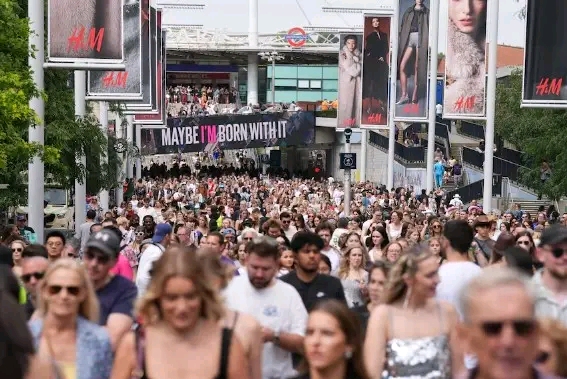CELEBRITY
Wembley Stadium’s ban on “Tay-gating” for Taylor Swift fans is a clear example of a “terrorism tax”

Wembley Stadium’s ban on “Tay-gating”, though disappointing, is a precaution designed to ensure that a joyous event doesn’t turn into a tragedy. This is the price we pay in times of heightened security threats to safeguard the lives of young and enthusiastic fans.
During Taylor Swift’s world-wide Eras Tour, fans have popularised the practice of “Tay-gating”, where they gather outside venues without tickets in order to enjoy the music and atmosphere. The practice of “Tay-gating” has evolved into more than just an opportunity to hear Taylor Swift’s music; it has become a cultural ritual that unites fans in shared experience and community.
For many, “Tay-gating” is a way of participating in the excitement of Taylor Swift’s concerts, even without a ticket — as seen in cities like Munich, where 50,000 fans gathered outside the Olympiastadion on a hillside to be part of the event. “Tay-gating” has turned into a collective celebration, showing the lengths to which Swift’s fans go to feel connected to her music and each other.
In the lead-up to her concerts in London, Wembley Stadium has announced that “no one is allowed to stand outside any entrance or on the Olympic Steps” without a ticket, effectively banning “Tay-gating”. This decision follows the cancellation of Taylor Swift’s Vienna shows due to a foiled terror plot.
The ban on “Tay-gating” is a clear instance of what is called a “terrorism tax”, the indirect costs that society incurs due to the need to prevent, mitigate, and respond to terrorism. This tax is obviously not a literal levy but rather a metaphorical term which expresses a set of burdens that affect our economy, public policies, and daily lives due to the threat of terrorism.
What does a “terrorism tax” look like?
Historically, key terror events have driven significant changes in public policy and behaviour. For instance, the attacks on 11 September 2001 fundamentally altered airport security throughout the world. Before 9/11, air travel was relatively carefree, with minimal screening and a more relaxed atmosphere. However, the attacks led to the creation of the Transportation Security Administration (TSA) in the United States, and stringent security checks became the global norm ever since.
The introduction of two key airport security measures after 9/11 — baggage screening and the federalisation of passenger screening — had significant effects on air travel demand. In the United States, for example. research shows that baggage screening led to a 6 per cent reduction in passenger volume across all flights, with a 9 per cent drop in the nation’s fifty busiest airports. An unintended consequence of baggage screening was a sharp decline in demand, costing the airline industry approximately $1.1 billion, a substantial part of the broader economic fallout from 9/11.
Another pivotal example is the 2006 transatlantic aircraft plot, which involved a foiled plan to detonate liquid explosives on flights from the UK to the United States. The plot led to the immediate global ban on carrying liquids over 100 millilitres in hand luggage — a rule that remains in place today. This single incident changed how millions of people travel, demonstrating how the fear of terrorism can trigger widespread, long-lasting changes in behaviour, policy, and way of life.
How terrorism taxes works
The terrorism tax has several dimensions. First, there are the economic costs — which includes aspects such as increased government spending on security, higher insurance premiums, the economic implications of disrupted industries like tourism, and the financial burden on businesses that must implement stricter safety measures.
Then there is the psychological impact. Living under the threat of terrorism can alter how people perceive risk and engage with public life. The fear generated by potential attacks often leads to changes in behaviour — like avoiding crowded places, altering travel plans, or even accepting invasive security measures as normal.
There are also social costs. The increased surveillance and security can lead to a loss of privacy, restrictions on civil liberties, and a general climate of fear. The ban on “Tay-gating” is a prime example of such a social cost where public enjoyment and cultural practices are sacrificed to ensure safety.
The pervasive atmosphere of fear and the need for constant security checks can gradually erode the trust that typically underpins social interactions. Even when the effect is transient, it is still a relatively high cost to pay. Over time, the constant presence of security measures can lead to the internalisation of suspicion as a norm. People might begin to subconsciously assess others based on perceived risk factors. This can, in the long run, lead to a more fragmented society where fear overrides communal bonds.
How terrorist organisations achieve their goals
Terrorist organisations are acutely aware of the way terror taxes work. They know that they can strategically exploit the concept of the terrorism tax to impose societal burdens with minimal effort or cost. By issuing threats or creating the impression of an impending attack, such organisations can trigger expensive and disruptive security responses.
For instance, false alarms or vague threats can lead to mass evacuations, increased surveillance, and heightened alert levels — all of which are costly and strain public resources. This tactic, also known as “hoaxing” or “fake terrorism”, allows terrorists to achieve their goal of creating widespread fear and disruption without actually carrying out an attack.

This tactic of leveraging the terrorism tax is akin to the broader concept of asymmetric warfare, where smaller, less resourced actors use unconventional means to challenge more powerful entities. Terrorist organisations often rely on the psychological impact of their actions, understanding that the mere threat of violence can provoke disproportionate responses from governments and societies.
Are terror taxes worth the cost?
Despite its burdens, the terrorism tax is sometimes an unavoidable price that we have to pay, especially when it comes to protecting lives and minimising risk. While the costs — both financial and cultural — are high, they are often justified by the need to prevent greater tragedies.
The ban on “Tay-gating” as a cultural phenomenon of significant global importance to many young people, though disappointing for fans, is a precaution designed to ensure that a joyous event doesn’t turn into a tragedy, like that of the 2017 Manchester Arena attacks.
In this context, the “tax” is the price we pay in times of heightened security threats to safeguard the lives of young and enthusiastic Taylor Swift fans, whose passion for the artist might otherwise lead them to take risks that could compromise their.












